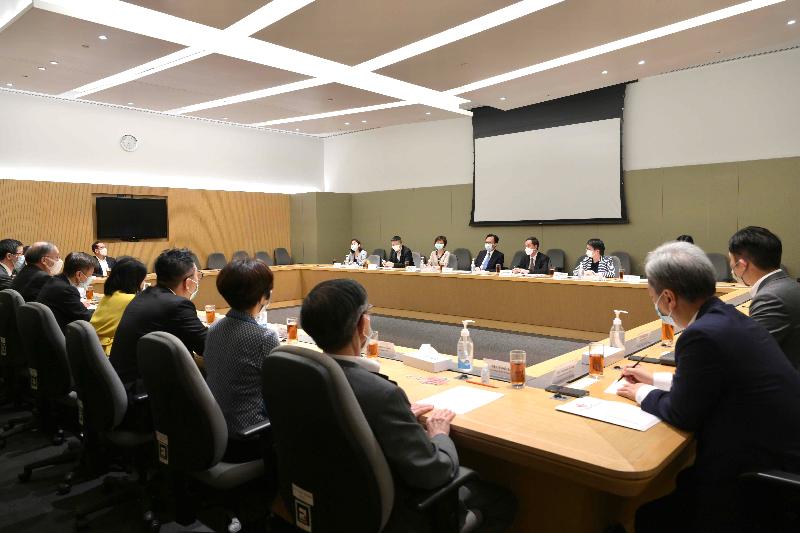Community vaccination centres to provide some 2 000 jobs for travel trade (with photo)
Starting from May 1, the Government's Job Creation Scheme under the Anti-epidemic Fund will provide up to 2 000 short-term jobs for a period of around five months for practitioners in the travel trade to be responsible for the operation and administrative work at 24 community vaccination centres (CVCs) which are not operated by private hospitals.
The Secretary for the Civil Service, Mr Patrick Nip, today (March 29) met with representatives of the travel trade to listen to their proposal and reached a consensus with the trade on the scheme.
"Lasting for over a year, the epidemic has dealt a heavy blow to various trades including the tourism industry. Many practitioners of the travel trade have to face the problems of being laid off or underemployment, which have seriously affected their livelihood. Therefore, when the travel trade put forward a proposal to the Government, my colleagues and I immediately liaised and discussed with the trade to gauge their views and to map out details of the measure to create short-term jobs within a short period of time. It is hoped that the measure would help to address the imminent needs of some practitioners of the trade," Mr Nip said.
"The work of practitioners in the travel trade includes registration, briefing and crowd management, etc. They also need to deal with unexpected events very often. Such experience and skills are similar to that of the management and administrative support work required in the CVCs. It is expected that they will be able to take up the work at the CVCs soon after receiving a short period of training and familiarisation. The inoculation and medical-related duties will continue to be handled by professional medical staff."
Eighteen organisations in the travel sector including the Travel Industry Council of Hong Kong, the Federation of Hong Kong Hotel Owners and the Hong Kong Hotels Association will set up an administrative supporting company to conduct the recruitment work. The scheme is expected to create about 1 400 to 2 000 jobs. Eligible applicants include tour guides, tour escorts, staff of travel agents, staff of hotels, drivers of coaches and the like. The appointees will be employed for a period of around five months from May 1, and the monthly salaries will range from $10,000 to $40,000 depending on whether they work full-time or part-time and the positions they hold. The estimated cost of the scheme is about $150 million.
To relieve the worsening unemployment situation due to the epidemic and the anti-epidemic measures, the Government has earmarked $6.6 billion under the Anti-epidemic Fund last year to create about 30 000 time-limited jobs in the public and private sectors within two years for people of different skill sets and academic qualifications. In view of the persistently high unemployment rate, the Government announced in the 2021-22 Budget to further earmark $6.6 billion to create about 30 000 additional time-limited jobs.
Relevant government departments will liaise with non-governmental organisations or relevant associations under their purview to formulate details of the additional jobs. As at end February 2021, around 31 000 jobs have been created, with half of the jobs being created in the Government and the other half in the non-governmental sector. Among the jobs already created, around 18 000 jobs have been filled while the recruitment of the remaining 13 000 jobs is in progress or will commence shortly. More than 30 per cent of the jobs created are suitable for young people or have been created for fresh graduates, with more than 40 per cent of them being relatively junior positions. The major types of jobs created include technical and non-skilled workers, cleaning and supporting staff, staff providing administrative, executive and clerical support, as well as jobs related to anti-epidemic work.
Currently, the Government deploys manpower from various departments to perform the operation and management work at the CVCs. Since the CVCs will continue to operate for a period of time, the provision of administrative support by the travel trade will allow for a more flexible deployment of manpower, and civil servants who have been deployed to the CVCs earlier will return to their original posts and continue to provide services to the public.
